Key takeaways:
- Effective brand crisis management relies on transparent communication and swift, thoughtful responses to rebuild trust.
- Consistent engagement with audiences, including listening to feedback and showcasing core values, strengthens brand loyalty.
- Empathy and genuine understanding during crises can turn negative experiences into opportunities for connection and growth.
- Proactive monitoring and preparedness are essential in mitigating damage and fostering trust during unforeseen challenges.
Author: Evelyn Harper
Bio: Evelyn Harper is an award-winning author known for her captivating novels that explore the complexities of human relationships and the beauty of everyday life. With a background in psychology and a passion for storytelling, she weaves intricate narratives that resonate with readers around the globe. Evelyn’s work has been featured in numerous literary magazines, and her debut novel was listed as a bestseller. When she’s not writing, she enjoys hiking in the mountains of her home state, Oregon, where she draws inspiration from nature and the world around her.
Understanding brand crisis management
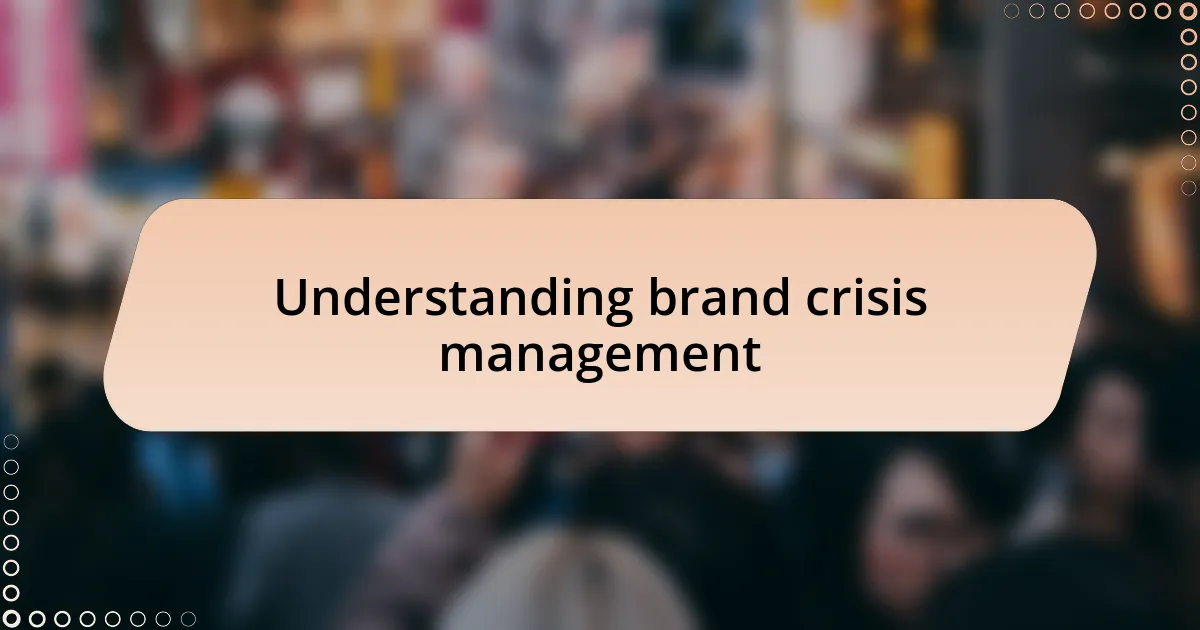
Brand crisis management is essentially about navigating the storm when things go awry. I remember a time when a well-known brand faced backlash due to a poorly received advertisement. It was fascinating to observe how they immediately shifted their strategy, engaging openly with their audience to rebuild trust. Isn’t it intriguing how transparency can turn a crisis into an opportunity for connection?
Understanding brand crisis management means recognizing that every misstep can either damage or rejuvenate a brand. I often think about the emotional weight behind these situations. When brands falter, they don’t just lose customers; they affect the lives of many who may feel a deep-seated loyalty. How do we, as marketers, help navigate that emotional landscape to reassure stakeholders and customers alike?
At its core, successful brand crisis management hinges on swift and thoughtful response strategies. I recall a company I consulted for that faced a product recall. Instead of hiding the news, they proactively communicated with their customers, explaining the steps they were taking. It was a revelation for me, highlighting how authentic communication can help salvage a relationship. Does that mean we should always embrace honesty, even when it’s uncomfortable? I believe so, as it’s the foundation of trust—an invaluable currency in today’s market.
Strategies for maintaining brand reputation
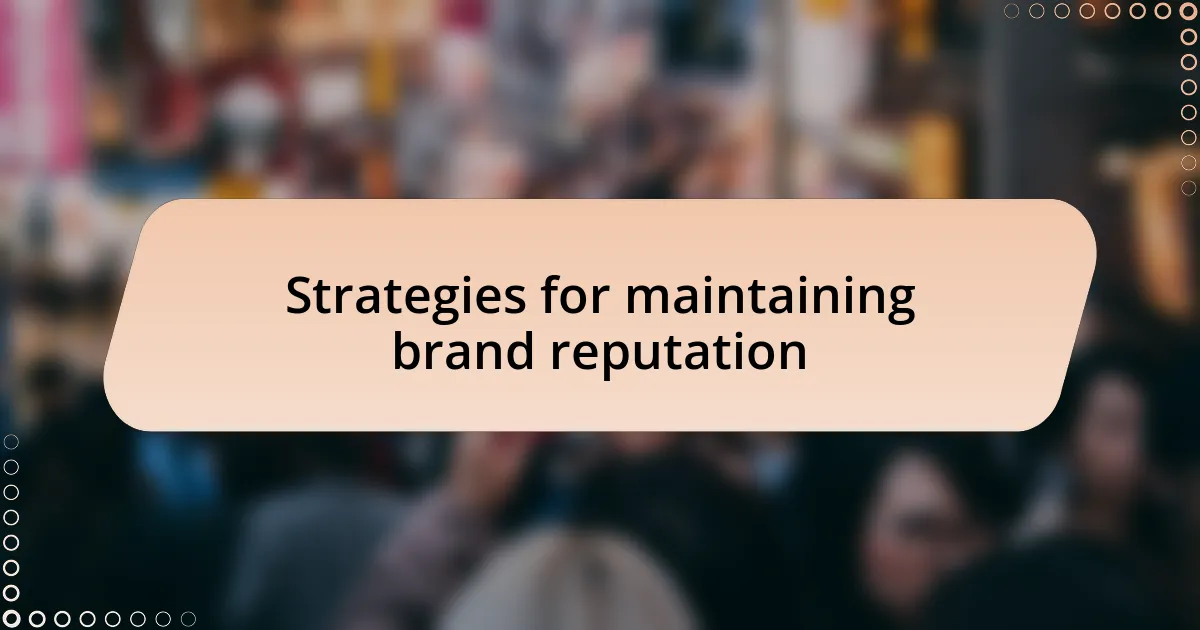
One effective strategy for maintaining brand reputation is consistent communication with your audience. During a particularly challenging campaign I managed, I discovered the power of regular updates. By sharing not only the good news but also the setbacks, I found that customers appreciated the authenticity. It sparked a sense of community and accountability, making them feel part of the journey. Have you ever noticed how brands that keep their customers in the loop often foster stronger loyalty?
Another approach involves actively listening to customer feedback. I remember when a brand I worked with faced criticism over its customer service. Instead of defensively denying the claims, they initiated an open feedback forum. This decision not only highlighted their commitment to improvement but also empowered customers to voice their concerns. Isn’t it remarkable how embracing constructive criticism can pave the way for growth?
Furthermore, it’s crucial to showcase your brand’s values consistently. I think back to a non-profit organization I supported that, through every campaign, aligned their messaging with their core principles. This unwavering dedication to their mission resonated deeply with their audience, reinforcing trust and loyalty. How often do we reflect on the values we portray? Sticking to your principles, especially in tough times, can be a cornerstone for maintaining a positive brand reputation.
Personal experiences with brand crises
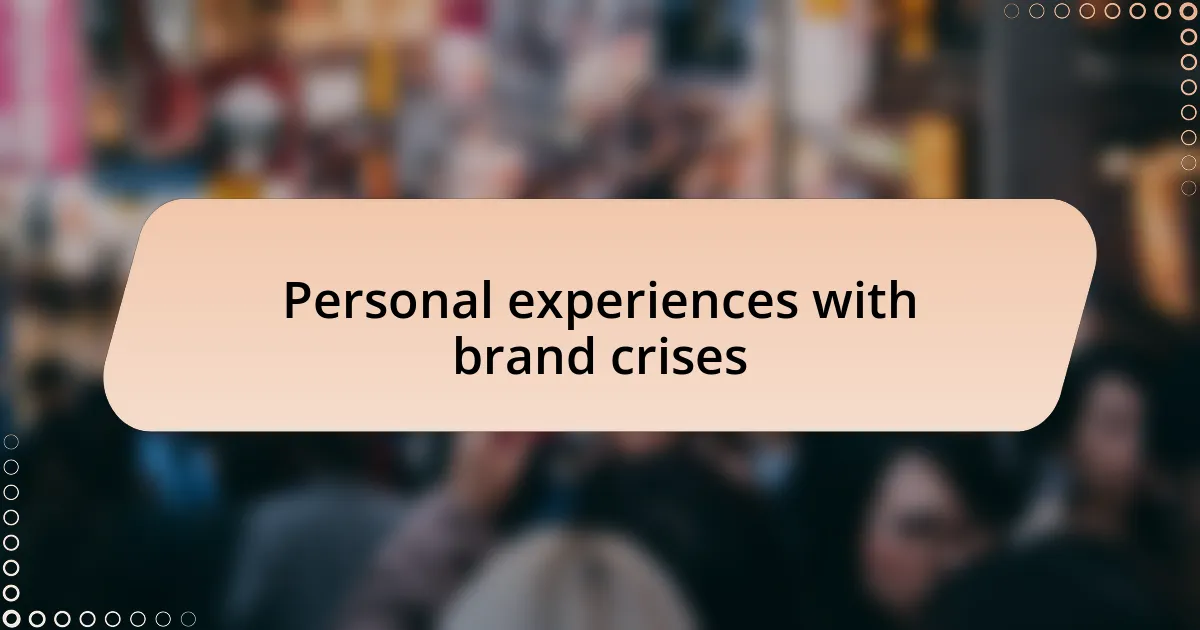
When I think back to a particularly notable crisis, I remember working with a beverage brand that faced backlash after a misguided advertising campaign. The initial shock hit hard, but what I learned was how crucial it is to act quickly and take responsibility. By hosting live Q&A sessions, we slowly began rebuilding trust. Have you ever experienced a moment when a brand’s openness shifted your perspective?
Another time, I found myself navigating a social media storm for a retail client whose product failed to meet quality expectations. With each complaint flooding in, my instinct was to jump into damage control. However, I chose to take a moment to listen, empathizing with our customers instead of merely reacting. This empathetic approach turned a potential disaster into a chance to showcase our commitment to quality. Isn’t it amazing how genuine understanding can turn a crisis into an opportunity for connection?
Finally, I recall supporting a tech company that suffered a data breach. The immediate fear was palpable, both from customers and within the team. What struck me was our decision to be brutally honest about the steps we were taking to enhance security. Crafting transparent emails that detailed our action plan not only calmed our audience but also fostered a renewed sense of loyalty. Don’t you think that in the face of adversity, transparency can become a brand’s greatest asset?
Lessons learned from past crises
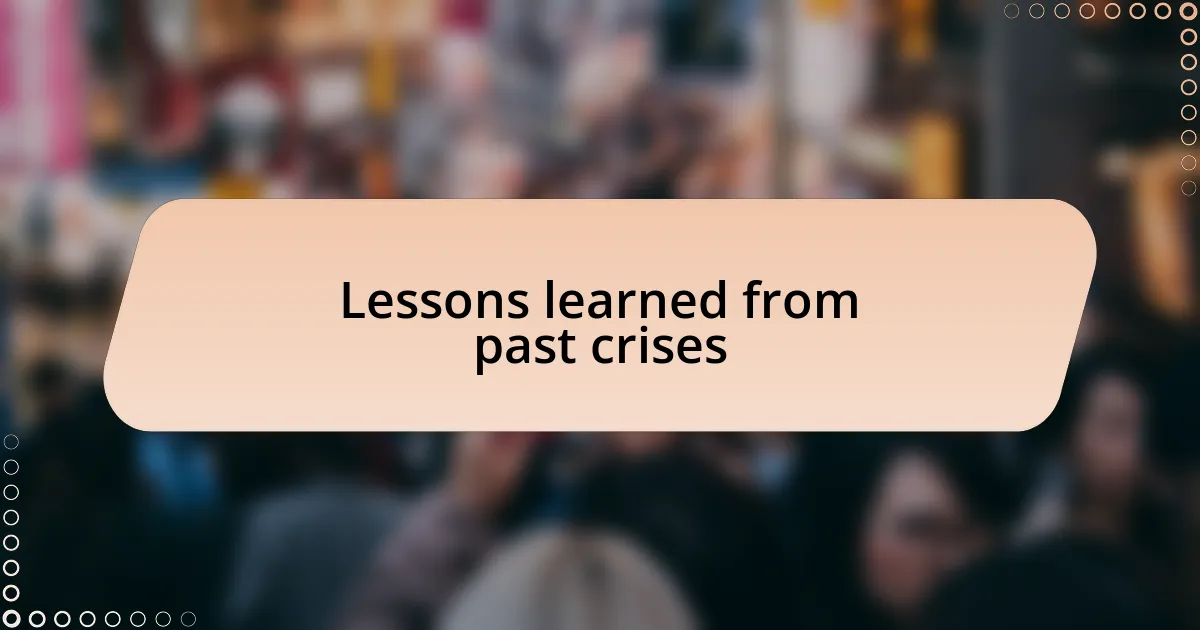
During my time in marketing consulting, I learned that regular monitoring and a proactive approach are key in crisis management. I remember a food brand facing a recall due to contamination concerns. The quick establishment of a dedicated crisis team ensured that we could address customer inquiries and concerns efficiently. Isn’t it fascinating how preparedness can mitigate damage and foster trust even during challenging times?
On another occasion, I dealt with a clothing brand whose founder made controversial statements. Instead of retreating, the brand emphasized its core values in a heartfelt message, inviting conversations with both supporters and critics. This reminded me that acknowledging discomfort and encouraging dialogue can turn a backlash into a chance for growth. How often do we overlook the power of listening in restoring brand image?
Reflecting on a tech startup that was criticized for lack of diversity, I recall how they took the high road by pledging to improve inclusivity and sharing measurable goals with the public. Their commitment to change resonated deeply, proving that sincerity in addressing shortcomings can transform criticism into a narrative of positive evolution. It’s intriguing to consider how genuine accountability can shift consumer perceptions and build a more resilient brand.
Practical tips for brand recovery
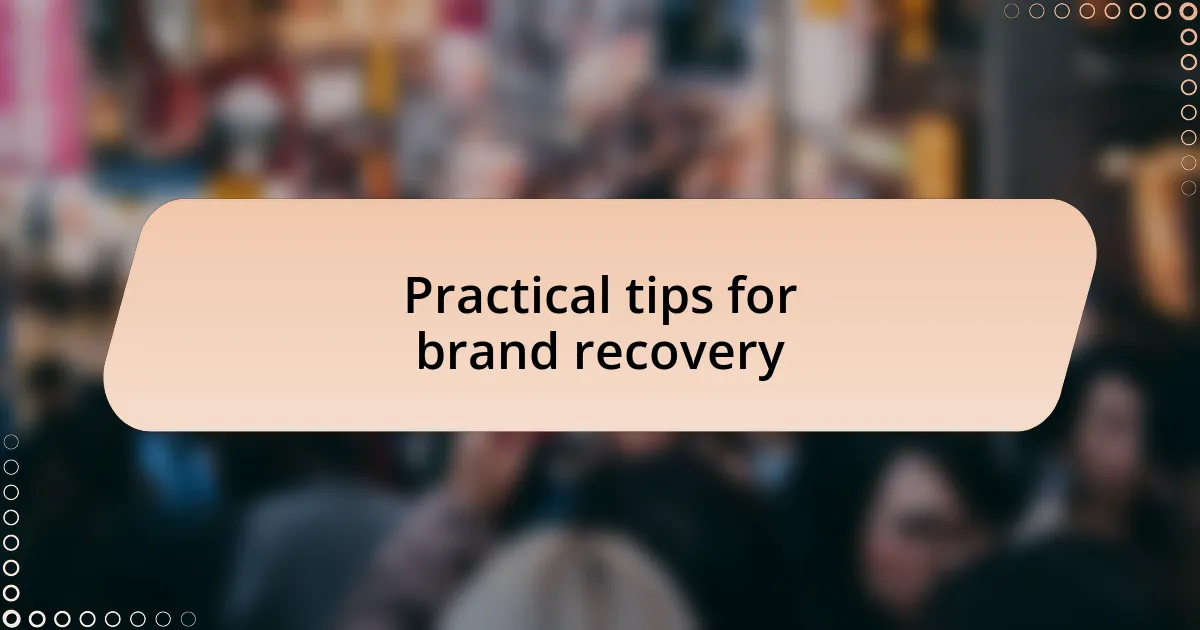
One practical tip for brand recovery is to prioritize transparent communication. I remember working with a beverage company facing negative press over a marketing mishap. They chose to openly address the issue by publicly apologizing and outlining steps for corrective action. I felt the shift in public sentiment; transparency can often turn skepticism into support, reminding us that honesty is valued in tumultuous times. What better way to show you care than by openly discussing your missteps?
Another important strategy is to evaluate and refine your brand’s messaging. In one instance, I collaborated with a small startup that inadvertently offended customers with an ad campaign. Instead of ignoring the mistake, they swiftly re-engaged their audience through a revamped, inclusive message that emphasized community values and respect. It was inspiring to witness their evolution; don’t underestimate the impact of rethinking and reshaping how you communicate with your audience.
Finally, embrace feedback as a tool for growth. I recall a well-known retail brand that faced backlash for poor customer service during an online sale. Rather than dismissing the criticism, they launched a feedback initiative, inviting customers to share their experiences. This proactive approach not only improved their service but also strengthened relationships with their audience. Have you considered how engaging customers can create powerful recovery pathways for your brand?